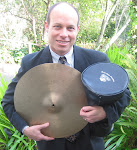Mr. Berube’s research has shown that the area of central Berkeley bounded by University Avenue and Oxford Street [pictured partly in the background of the photo above--MS] has one of the highest concentrations of poverty in the Bay Area, on par with perennially distressed areas like West Oakland and the Bayview Hunters Point neighborhood of San Francisco.The University of California hosts about 30,000 students, most who live as close to campus as possible, that is, in central Berkeley. (The population of Berkeley is about 100,000.) Most college students live under circumstances of near-poverty, especially Cal's 10,000 graduate students. (As a Cal undergraduate, I survived off an income of less than $5,000 per year.) Mr. Berube is describing much of the student ghetto. I don't think these kids getting PhD's in engineering will be impoverished for long. All cities have chronic poor, those on the way up, and rich people. Berkeley has its poor, but the students shouldn't count as part of the city's Gini (inequality) score.
Secondly, the reporter writes
Other observers said income inequality persisted in Berkeley because the city’s most progressive policies had been blocked by higher authorities. In 2009, for example, the California Supreme Court let stand a ruling voiding ordinances that require developers to set aside units for low-income residents when they build new apartment complexes.Huh? Since developers weren't forced to build for low-income residents, fewer poor people were able to live in Berkeley, making incomes more equal, not less. Berkeley's "progressive policies" have nothing to do with income inequality.
But Councilman Kriss Worthington said officials were not giving up in efforts to reduce inequality.I'm sure the Berkeley government will find ways of poorly combating a non-issue. After all, it is Berkeley.





No comments:
Post a Comment